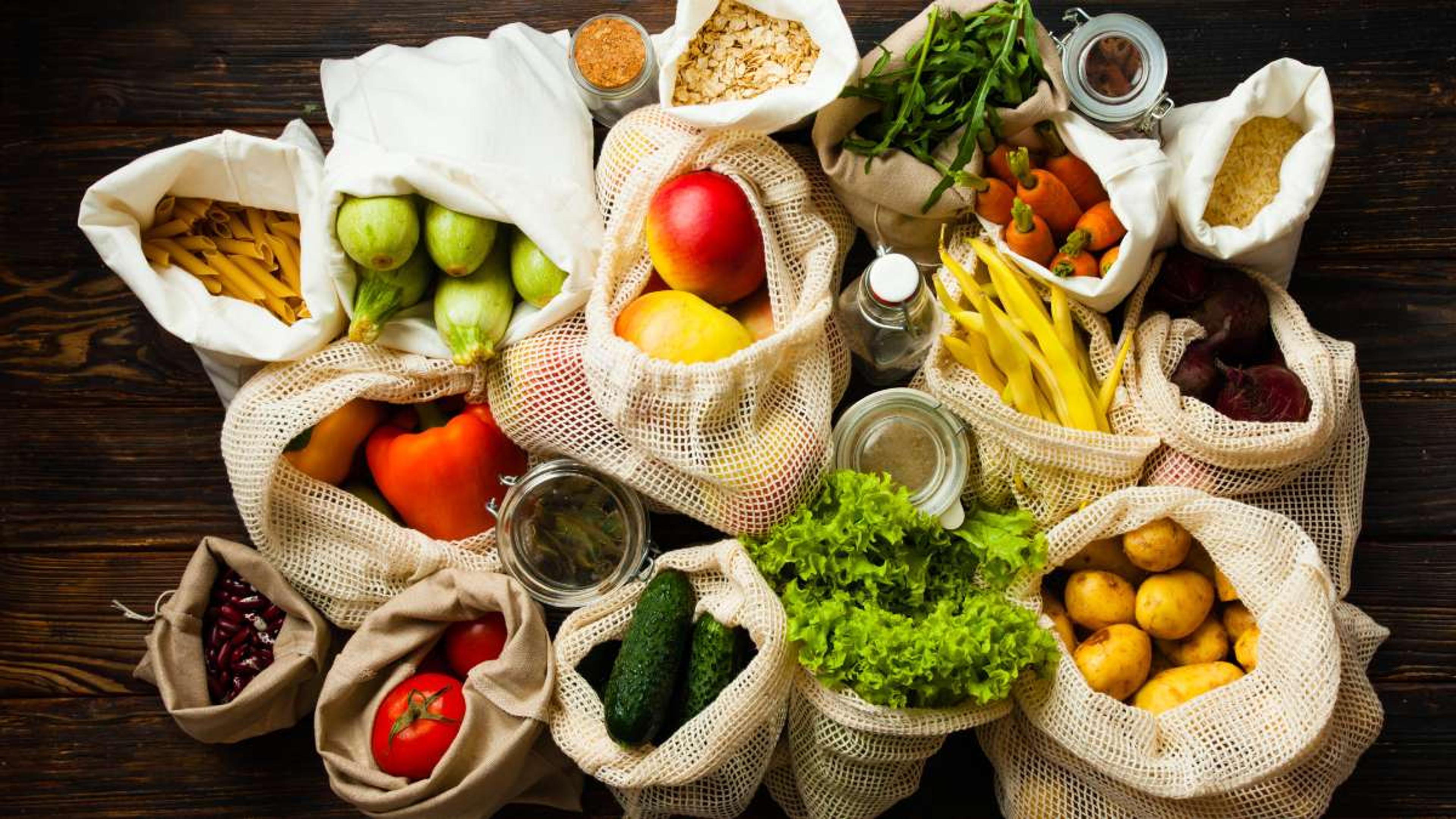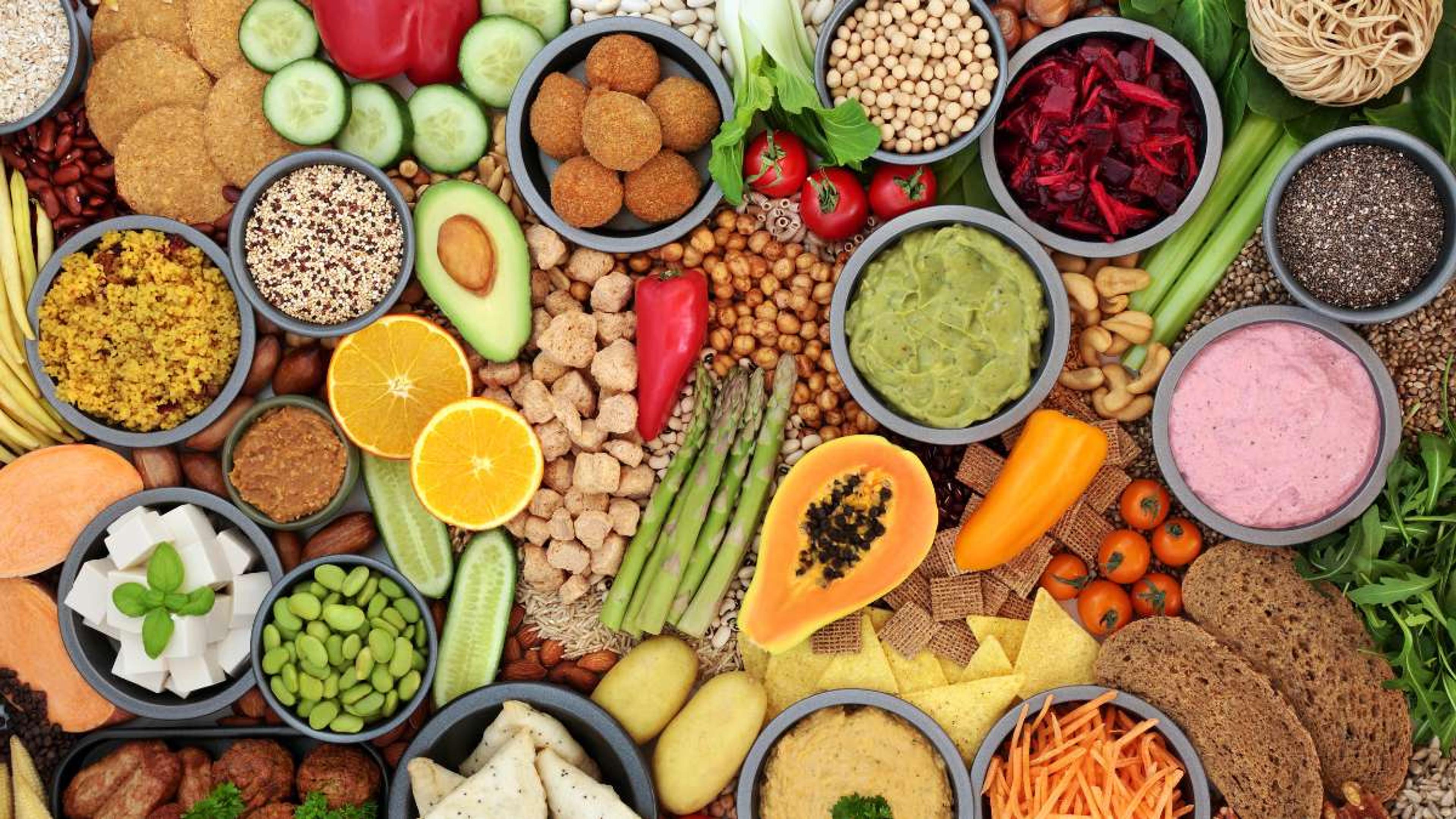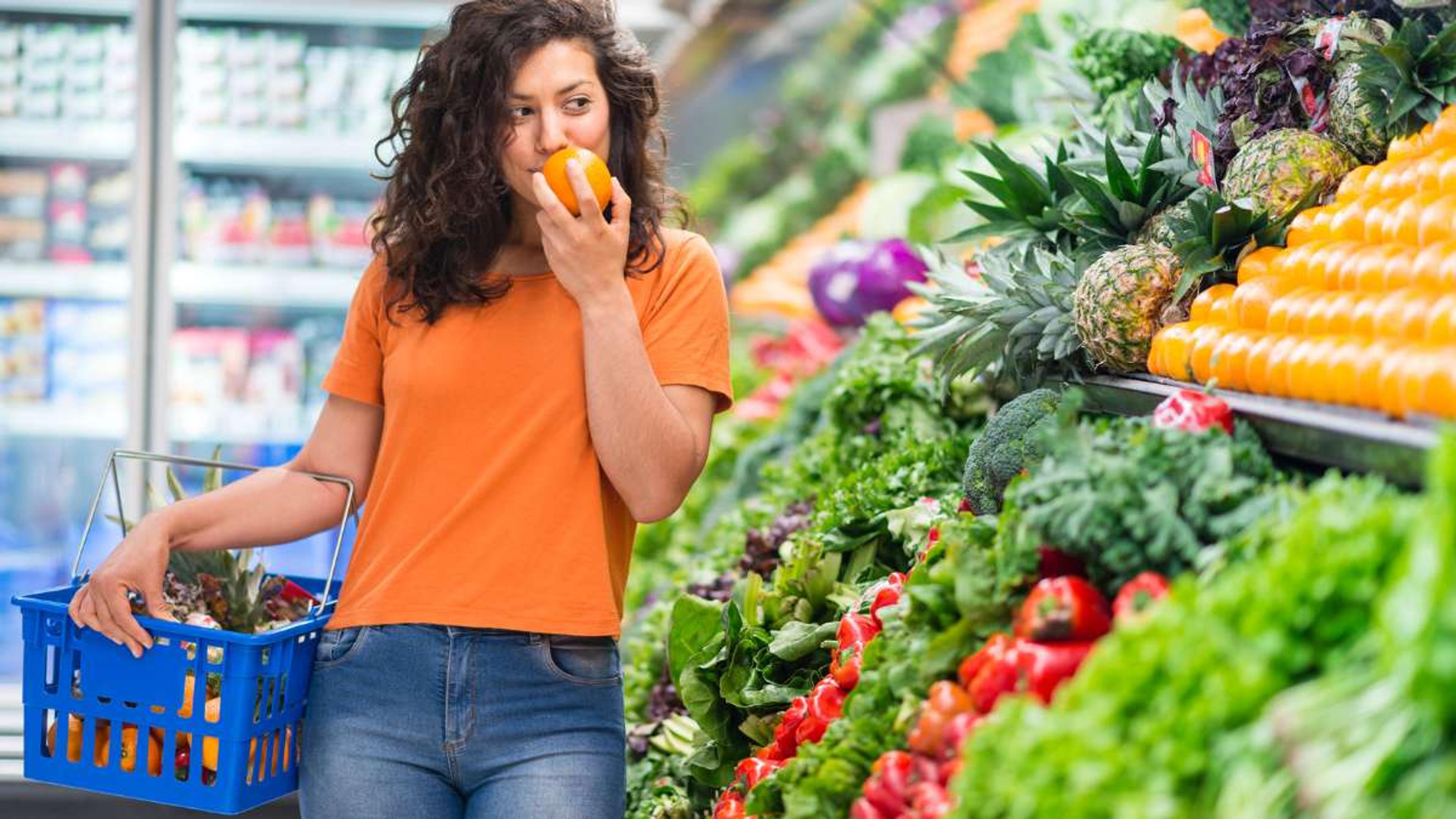Vegan Foods for Beginners: Tips and Recipes for Success

- Key Takeaways
- What is a Vegan Diet?
- List of 10 Essential Vegan Foods
- Vegan Food Shopping Pointers
- Conclusion
- FAQs
Starting a vegan diet can feel like stepping into uncharted territory - there's so much to learn and taste! Being plant-based means saying goodbye to all animal products, including eggs and cheese.
This article will introduce you to 10 essential vegan foods that are tasty, nutritious, and easy to incorporate into your meals. Ready for a culinary adventure? Let’s dive in!
Key Takeaways
- A vegan diet consists of plant-based foods and excludes all animal products.
- Essential vegan foods include fruits and vegetables, whole grains, legumes and beans, nuts and seeds, plant-based proteins, non-dairy milk alternatives, baking and cooking items, meat replacements, snacks, and beverages, as well as fortified foods and supplements if needed.
- When shopping for vegan foods, look for popular vegan brands that offer a wide range of plant-based alternatives. Choose whole foods over processed options to maintain a healthy diet. Plan your meals in advance and read food labels carefully to avoid hidden animal products.
What is a Vegan Diet?
A vegan diet is one with no animal products. This means no meat, dairy, or cheese. It also means no honey, insects, gelatine and other things made from animals. People on this diet eat whole plant foods like fruits, vegetables, whole grains, legumes, nuts and seeds.
Vegan foods can be so tasty! You can enjoy fruits and veggies of all kinds. Beans and breads are part of this too. But the bread must not have any dairy or eggs in it. There's more too - you can have dairy alternatives such as almond milk or soy yogurt!
List of 10 Essential Vegan Foods
The list of 10 essential vegan foods includes fruits and vegetables, whole grains, legumes and beans, nuts and seeds, plant-based proteins, non-dairy milk alternatives, baking and cooking items, meat replacements, snacks and beverages, and fortified foods and supplements if needed.

1. Fruits and Vegetables
Fruits and veggies should come first in a vegan diet. These can be fresh or from the frozen section of your grocery store. Fruits like apples, oranges, and bananas are packed with essential nutrients - don't forget to include your most favourite local picks.
They also make great snacks.
Veggies add color to your plate and power to your body. Sweet potatoes, carrots, celery, spinach, and cucumbers are full of essential nutrients. You can eat them raw or cook them for meals. They're perfect for stir-fries or blended into smoothies too!
2. Whole Grains
Whole grains are a key part of a vegan diet. They give your body what it needs to stay healthy and strong. You get things like complex carbs, fiber, and iron from them. Whole grains also have B vitamins, magnesium, phosphorus, and zinc. Examples of whole grains include quinoa, brown rice, oats, whole wheat bread, and barley. These grains can be cooked into delicious dishes like grain bowls, porridge, or used as a base for salads.
3. Legumes and Beans
Legumes and beans are essential vegan foods that provide a good amount of protein and fiber. They include pinto beans, yellow split peas, green split peas, mung beans, pink beans, and kidney beans.
These legumes are not only nutritious but also versatile in cooking. Lentils, for example, are rich in protein and should be included regularly in a vegan diet. Consuming legumes and nuts daily is recommended for vegetarians and vegans to ensure they get enough nutrients.
So, whether you enjoy them in soups or salads or as part of curries and stir-fries, incorporating legumes and beans into your meals is a great way to support a healthy plant-based lifestyle.
4. Nuts and Seeds
Nuts and seeds are important for a vegan diet. They are packed with nutrients like iron, fiber, magnesium, zinc, selenium, and vitamin E. Including a variety of nuts and seeds in your meals6 is a great way to get these essential nutrients.
They also provide protein and healthy fats that are good for you. Adding nuts and seeds to your dishes adds flavor and texture too. So make sure to include them in your shopping list!
5. Plant-Based Proteins
Plant-based proteins are an important component of a vegan diet. They provide the body with essential nutrients and help to build and repair tissues. Some popular plant-based protein sources include tofu, lentils, nuts, seeds, and quinoa.
These foods are not only rich in protein but also packed with vitamins, minerals, and healthy fats. Soy protein is another great option for vegans as it contains all essential amino acids needed by the body.
Leafy greens like spinach and watercress are also good sources of protein. Adding these plant-based proteins to your meals can ensure that you're getting enough protein while following a vegan lifestyle.
6. Non-Dairy Milk Alternatives
Non-dairy milk alternatives are a great option for vegans and those who cannot consume dairy products. Some popular choices include soy milk, almond milk, walnut milk, peanut milk, cashew milk, hazelnut milk, and macadamia nut milk.
These plant-based milks can be used in tea or other recipes and should be chosen without added sugar. While it's true that regular dairy products like cow's milk provide protein and calcium, non-dairy milks can still be a good source of nutrition for those on a vegan diet.
7. Baking and cooking items
Vegan baking and cooking items are important to have in your pantry. These include bread, tortillas, pasta, grains, beans, legumes, nuts, seeds, dairy alternatives like almond milk or soy milk.
Having these essentials on hand will make it easier to create delicious vegan dishes. Spices are also crucial for adding flavor to your meals. With a well-stocked pantry of baking and cooking items, you'll be able to whip up tasty vegan recipes whenever you want!
8. Meat replacements
Meat replacements are a great option for those transitioning to a vegan diet. There are various choices available, such as tempeh and tofu, which are high in protein. Tempeh is made from fermented soy and has been used as a meat substitute in Asian cuisine for centuries.
Tofu, on the other hand, is a versatile ingredient that can be cooked in different ways to mimic the texture of meat. Another option is textured vegetable protein, which is made from soy flour and can be used to create dishes like burgers or ground "meat." When choosing meat replacements, it's important to prioritize whole food sources of protein like legumes, nuts, seeds, and whole grains.
9. Snacks and Beverages
Snacks such as almonds, walnuts, dried fruit, and veggie sticks are great options for a quick pick-me-up throughout the day. Beverages like smoothies made with non-dairy milk alternatives or infused water with fruits and herbs can be refreshing and hydrating choices for beginners on a vegan diet.
10. Fortified Foods and Supplements (If needed)
To ensure you're getting all the necessary nutrients on a vegan diet, fortified foods and supplements can be helpful. Some essential nutrients to consider are vitamin B12, calcium, and omega-3 fatty acids.
Nutritional yeast is a great source of vitamin B12 when it's fortified. Calcium-fortified foods like soy milk, orange juice, tofu with calcium, broccoli, kale, and almonds can help meet your calcium needs.
For omega-3s, flaxseeds, vegetable oils, and plant-based supplements are excellent options. Including these fortified foods and supplements in your diet can help ensure you're getting all the nutrients your body needs as a vegan.
Vegan Food Shopping Pointers
When shopping for vegan foods, look out for popular vegan brands and choose whole foods over processed options. Plan your meals in advance and make sure to read food labels carefully to avoid any hidden animal products.

Popular Vegan Brands
There are many popular vegan brands that offer a wide range of plant-based alternatives. Here are some well-known ones:
- Beyond Meat - Known for their Beyond Burger and other meat substitutes.
- Daiya - Offers dairy-free cheese alternatives, including shreds, slices, and blocks.
- Gardein - Provides a variety of meatless protein options like chicken strips, beefless tips, and fishless filets.
- Field Roast - Specializes in grain-based products like sausages, frankfurters, and deli slices.
- Tofurky - Offers plant-based deli slices, ground meat alternatives, and holiday roasts.
- So Delicious - Produces non-dairy milk alternatives like almond milk, coconut milk, and cashew milk as well as frozen desserts.
- Follow Your Heart - Known for their vegan mayonnaise alternative called Vegenaise and dairy-free cheeses.
- Earth Balance - Offers plant-based buttery spreads and baking products.
- Kite Hill - Known for their artisanal almond milk yogurts and cream cheeses.
- Miyoko's Creamery - Produces high-quality vegan cheese wheels made from nuts.
While you try store-bought vegan food, don't forget to try your hands making them on your own - it's fun, healthier & opens your inner creative space.
Tips for navigating the grocery store
- Start by making a list of the vegan foods you need before going to the store.
- Look for fresh fruits and vegetables in the produce section, focusing on a variety of colors.
- Explore the whole grains aisle for options like quinoa, oats, and brown rice.
- Find legumes and beans, such as chickpeas and black beans, in cans or dried form.
- Don't forget about nuts and seeds like almonds and sesame seeds for added nutrition.
- Check out the plant-based proteins section for tofu, tempeh, and plant-based meat substitutes.
- Look for non-dairy milk alternatives like almond milk or soy milk in the refrigerated section.
- Don't overlook baking and cooking items like spices, vinegars, and oils that can enhance your meals.
- Consider trying meat replacements like veggie burgers or vegan sausages for familiar flavors.
- Look for snacks and beverages that are vegan-friendly, such as dried fruit or herbal teas.
Choosing whole foods
To maintain a healthy vegan diet, it's important to choose whole foods. This means opting for unprocessed and natural plant-based ingredients like fruits, vegetables, nuts, seeds, legumes, and grains.
Whole foods provide essential nutrients and fiber that are good for your body. They're also more satisfying and filling compared to processed vegan alternatives like fake meats or snacks.
By choosing whole foods over processed options, you can ensure that you're nourishing your body with the best nutritional value from natural sources.
Planning meals
- Make a weekly meal plan to stay organized and make sure you have all the ingredients you need.
- Include a variety of fruits, vegetables, whole grains, legumes, nuts, and seeds in your meals.
- Plan your meals around the foods that are in season to save money and get the freshest produce.
- Try different cuisines like Mexican, Italian, or Asian to keep things interesting and discover new vegan recipes.
- Prepare meals in advance or cook in batches to save time during busy weekdays.
- Experiment with different cooking methods like roasting, steaming, or stir-frying for variety in flavors.
- Don't forget to include snacks and beverages in your meal plan to keep yourself satisfied throughout the day.
- Aim for balanced meals that include protein-rich foods like tofu, lentils, or chickpeas along with healthy fats from avocado or nuts.
- Incorporate different colors of fruits and vegetables in your meals for a wide range of nutrients.
Understanding and reading food labels
Understanding and reading food labels is important for new vegans. Here are some tips to help you navigate food labels and make informed choices:
- Check the ingredients list: Look for plant-based ingredients like fruits, vegetables, whole grains, legumes, nuts, and seeds. Avoid animal-derived ingredients such as dairy, eggs, meat, and honey.
- Scan for sneaky ingredients: Some products may contain hidden animal ingredients like whey, gelatin, or casein. Be on the lookout for these terms and avoid them if you want to stick to a vegan diet.
- Look for "vegan" or "certified vegan" labels: Products that are specifically labeled as vegan can make your shopping experience easier. These labels assure you that the product does not contain any animal-derived ingredients.
- Be aware of common non-vegan additives: Some additives commonly used in processed foods may be derived from animals. Examples include carmine (a red food dye made from crushed insects) and lard (rendered pig fat). Familiarize yourself with these additives to avoid consuming them.
- Understand allergen warnings: Food labels often indicate if a product contains common allergens like milk, eggs, or nuts. While this information is essential for those with allergies, it can also be helpful for vegans who want to ensure they are avoiding animal products.
- Use apps or online resources: There are various smartphone apps and websites available that can help you identify whether a product is vegan-friendly by scanning barcodes or searching their databases.
Conclusion
In conclusion, adopting a vegan diet can be a great way for beginners to explore a plant-based lifestyle. By incorporating essential vegan foods like fruits, vegetables, whole grains, legumes, nuts, and seeds into their meals, individuals can enjoy a variety of nutritious options while still meeting their dietary needs.
With proper planning and knowledge about vegan food shopping pointers, anyone can embark on this journey toward healthier choices and make a positive impact on the environment and animal welfare.
So why not give it a try? Start experimenting with easy vegan recipes today!
FAQs
1. What is a vegan diet?
A vegan diet consists of eating only plant-based foods and avoiding all animal products, including meat, dairy, eggs, and honey.
2. Can I get enough protein on a vegan diet?
Yes, you can get enough protein on a vegan diet by incorporating sources such as tofu, tempeh, legumes (beans, lentils), quinoa, nuts, and seeds into your meals.
3. Are there any health benefits to following a vegan diet?
Following a well-balanced vegan diet can provide various health benefits such as lower risk of heart disease, high blood pressure, and type 2 diabetes; improved digestion; weight management; and increased intake of vitamins, minerals, and antioxidants from fruits and vegetables.
4. How do I start transitioning to a vegan diet?
To start transitioning to a vegan diet: gradually replace animal products with plant-based alternatives; experiment with new recipes using fruits, vegetables, grains, legumes, nuts, and seeds; educate yourself about proper nutrition for vegans; and seek support from online communities or local groups for guidance along the way.

